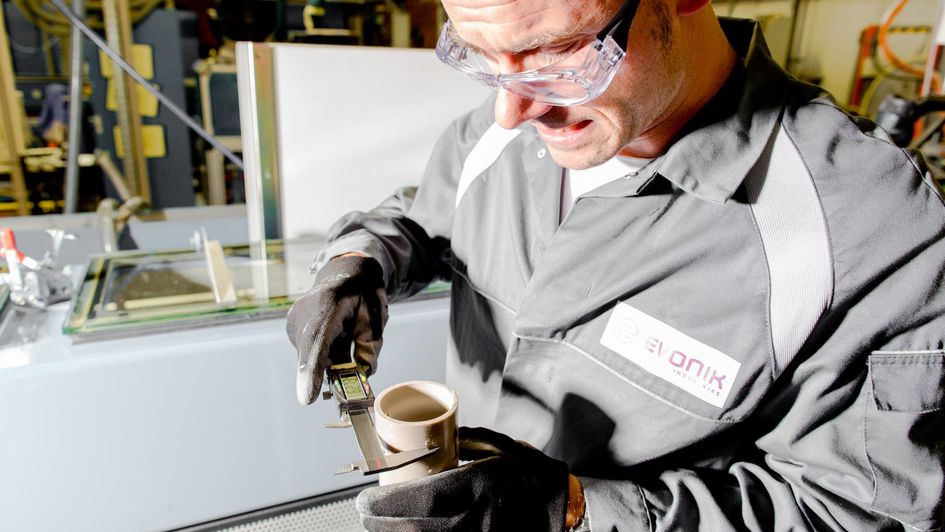FROM THE IDEA TO THE PRODUCT
Our support
For many years, we have been very familiar with the issues and challenges of our customers. They know us as a trustworthy partner. We see joint development as a holistic task: not only do we reliably supply high-quality polymers and semi-finished products, but we also want to work hand in hand with you to develop technically sophisticated system solutions. In doing so, you can rely on our expertise in selecting the right polymer for your applications as well as on our knowledge of processing methods in plastics technology.
Comprehensive service package for PEEK users

In other words: We offer an ALL-INCLUSIVE service for the user
- We work on many innovations jointly with our partners,
- advise them on mold design,
- provide intensive technical support and
- assistance with approval procedures.
It goes without saying, of course, that we react flexibly to the current demands of the market in executing these services.
OPTIMAL SUPPORT THROUGH YEARS OF EXPERIENCE
No matter whether it’s PEEK compounds or powders, PEEK blends, stock shapes, composites, or prepregs: Our customers can rely on our extensive know-how in all the common processing processes. Many years of applications expertise extending over almost all the relevant branches of technology have resulted in a number of synergies that can be smoothly transferred to all the fields of application of VESTAKEEP® PEEK.
These include, for example, mold and die expertise, experience in injection molding, and processing simulation, using advanced software, of the injection molding process from the filling phase through the holding pressure phase to the calculation of shrinkage and distortion. In addition, we provide comprehensive CAE support in the development of molds, dies, and shapes.
Our service offer also includes complete materials testing in accordance with all current ISO and ASTM standards.
Our comprehensive, expert technical consultancy services for our customers also include CAE services for the development of molds and parts.
For process simulation, we use advanced software to analyze the injection molding process from the filling phase, through the follow-up pressure phase, to calculation of shrinkage and warpage. As a result, information on processing, component properties and manufacturing costs can be obtained as early as the product development stage: For example
PROCESSING
- Ability of the mold to be filled
- Resulting process parameters such as pressure and temperature distributions
- Design of the cooling system
- Influence of various processing parameters
PART
- Location of weld lines
- Air pockets
- Shrinkage and warpage
- Fiber orientations
COST
- Required machine size
- Cycle time
- Part / mold complexity
The results of a simulation aid in the further design and optimization of the part, as well as its mold. Often, this approach can reduce costly changes and the number of times the mold and part must be used.
We also carry out FE structural calculations for the material-, stress- and production-compatible design and optimization of parts or complete assemblies. For example, we can calculate and evaluate the location of stresses, deformations, WW or temperatures in the molded part when it is exposed to external mechanical and/or thermal pressures.
Such methods allow us to evaluate the suitability of a wide variety of materials or material combinations (for example, in hybrid structures or composite components) for the relevant application at an early stage on the computer, and selectively adapt the material selection and construction. As a result, we can reduce the development time, as well as the number of time- and cost-intensive practical tests from the idea to the end product.
Our FE structural analyses simulate mechanical, thermal and thermo-mechanically coupled loads, and provide a range of information, such as the material behavior of porous materials, anisotropic fiber-reinforced materials, or the viscoelasticity and plastic behavior of non-linear materials.
Our customers normally require 3D CAD STEP-formatted files (IGES and STL file formats are also possible) with the geometry of the part to be analyzed, the entire assembly, or the mold, and depending on the task, information on parameters such as mold and process specifications. For molding simulation, we can include relevant material properties such as shear viscosity, thermal conductivity, or PVT behavior in the calculation. FE structural calculations require not only the part geometry but the most precise information possible on the specific load case, any critical zones of the part, the installation position, and the specified materials.
Our highly skilled teams in application engineering and market development discuss the task and results with the customer, and develop the right solutions.

